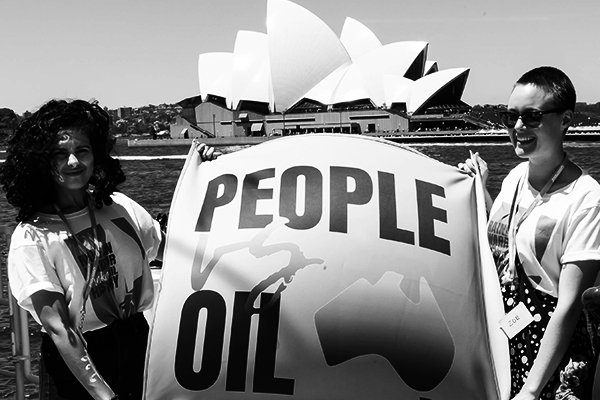- About
- Topics
- Picks
- Audio
- Story
- In-Depth
- Opinion
- News
- Donate
- Signup for our newsletterOur Editors' Best Picks.Send
Read, Debate: Engage.
Across the United States, Democratic constituents are exerting pressure on their elected officials to throw their full support behind the Green New Deal, a congressional resolution introduced by Rep. Alexandria Ocasio Cortez (D-NY) and Senator Edward J. Markey (D-MA) that aims to transform the U.S. energy industry while simultaneously improving societal inequalities. The increasing number of Americans pushing for an adoption of the Green New Deal indicates that a considerable portion of the public senses that immediate and comprehensive steps must be taken to tackle climate change and avoid its utterly catastrophic implications.
One of the first Senators to experience push-back from constituents for failing to support the initiative was Dianne Feinstein from California. Last Friday, a group of young students approached Feinstein at her San Francisco office and confronted her with pressing questions about her refusal to back up the Green New Deal. When Feinstein claimed that there is no way to pay for the Deal, the students replied by stating that the government has more than enough funds to funnel into the military, to which the Senator responded, “That resolution will not pass the Senate, and you can take that back to whoever sent you here and tell them… I’ve been in the Senate for over a quarter of a century and I know what can pass and I know what can’t pass.”
Feinstein later added that, “I have been and remain committed to doing everything I can to enact real, meaningful climate change legislation. I’ve been doing this for 30 years. I know what I’m doing. You come in here and you say it has to be my way or the highway. I don’t respond to that.” She further emphasized that while she believes the Green New Deal is infeasible and too ambitious, she has proposed her own plan to reduce emissions substantially by 2050.
Republicans in the Senate, spearheaded by Majority Leader Mitch McConnell, are planning to bring the Deal for a vote on the floor as soon as possible, primarily in order to put Democratic presidential candidates on the record regarding a plan that has been ridiculed and labeled as an impractical, quixotic socialist dream, and to foment tension and divisions among democrats. Meanwhile, the president has forged a team of counselors and experts in an effort to debunk scientific evidence tying humans to the rise in global temperatures. Just to paint a clear picture of what we’re dealing with here— one of the members of this panel was has been quoted comparing the “demonization of carbon dioxide” to the demonization of Jews by the Nazis.
The simple truth is that time is running out. The IPCC announcement from last year made it abundantly clear that humans have roughly 10 years to significantly reduce emissions in order to avoid irreversible damage. Furthermore, a report released earlier this week by a U.S-led team of scientists confirms that human activities’ role behind global warming has reached the ‘gold standard’ of scientific certainty, effectively eviscerating any counter-argument attempting to relieve humans from responsibility. Add to that an increase in global rates of natural disasters, extreme weather-patterns, and pollution-induced degradation of the ecosystem, humanitarian crises, and disease.
While Republicans are engaging in downright denial of climate change and utilise their authority to coddle oil-billionaires and thwart climate policy, many Democrats, some with good intentions, fail to take caregous and efficient enough steps to curb emissions and transition away from fossil fuels. Feinstein’s arguments in particular indicate that the main problem is that, for decades, politicians have narrowed their sights regarding climate policy, and that the consensus has been simply too far to the right.
What is too ambitious, perhaps, is to expect politicians to independently shift their position and support climate policy that meets the urgency and severity of the issue (whether due to their financial ties to the oil industry or their fear of losing elections). It is therefore up to the public to keep holding representatives accountable and pressure them to support creative initiatives, such as the Green New Deal, which appropriately address climate change, highlight the inextricable link between the environment and the well-being, safety, and prosperity of humans, and vow to take drastic steps in the immediate future.
